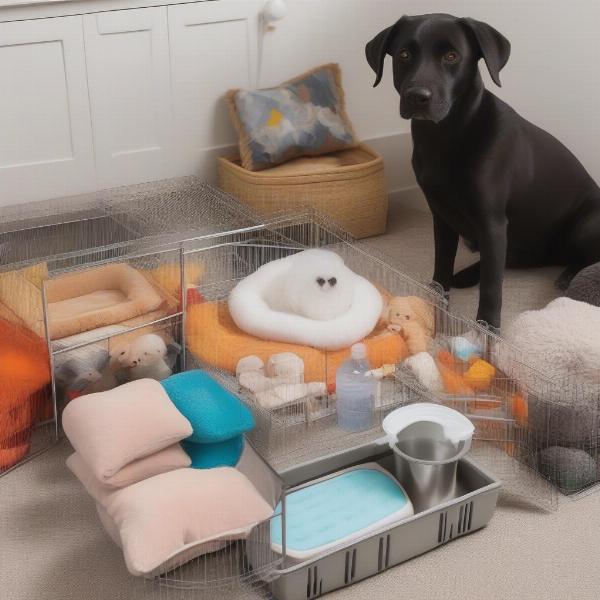Choosing to bring a puppy into your life is a rewarding experience. However, those early weeks and months are crucial for their development and well-being. Understanding the concept of a “dog nursery,” essentially creating a safe and enriching environment for your new puppy, is key to raising a happy, healthy, and well-adjusted dog. This guide will cover everything you need to know about setting up a dog nursery, from choosing the right space to providing essential care.
Setting Up the Perfect Dog Nursery
Creating a dedicated dog nursery provides a secure and comfortable haven for your puppy. Choose a quiet area in your home, away from high traffic and excessive noise. This will be their safe space where they can rest, play, and learn.
Choosing the Right Location
Ideally, your dog nursery should be a small, easily manageable space. A spare room, a sectioned-off area of a larger room, or even a large dog crate can work well. The key is to make it feel secure and comfortable.
Essential Supplies
Equip your dog nursery with the following essentials:
- A comfortable bed: Choose a bed that is soft, supportive, and appropriately sized for your puppy.
- Food and water bowls: Opt for stainless steel or ceramic bowls that are easy to clean.
- Safe toys: Provide a variety of toys to stimulate your puppy’s mind and encourage appropriate chewing behavior. Avoid toys with small parts that could be swallowed.
- Potty training supplies: If you are using puppy pads or a designated indoor potty area, ensure these are readily accessible.
 Essential supplies for a well-equipped dog nursery.
Essential supplies for a well-equipped dog nursery.
Nurturing Your Puppy in the Nursery
Once your dog nursery is set up, you can focus on providing the essential care your puppy needs.
Feeding and Hydration
Establish a regular feeding schedule and provide your puppy with high-quality puppy food appropriate for their breed and age. Always have fresh water available.
Potty Training
Consistent potty breaks and positive reinforcement are crucial for successful potty training. Take your puppy outside frequently, especially after waking up, eating, and playing.
Socialization and Playtime
Early socialization is vital for your puppy’s development. Expose them to a variety of sights, sounds, and smells within a safe and controlled environment. Provide ample opportunities for play and interaction to build their confidence and social skills.
Transitioning Out of the Nursery
As your puppy grows and becomes more independent, you can gradually transition them out of the nursery. This should be a gradual process to avoid overwhelming them.
Expanding Their Territory
Slowly introduce your puppy to other areas of your home, always under supervision. Ensure these areas are puppy-proofed to prevent accidents and destructive behavior.
Continued Training and Socialization
Continue to reinforce basic obedience training and provide ongoing socialization opportunities. Enroll your puppy in puppy classes or organize playdates with other vaccinated dogs.
Conclusion
Creating a dog nursery provides a nurturing and secure environment for your new puppy to thrive in their early stages of life. By following the tips outlined in this guide, you can ensure your puppy’s physical and emotional well-being, setting the foundation for a happy and healthy life together. Remember, a well-adjusted puppy is more likely to become a well-behaved adult dog.
FAQ
- How long should a puppy stay in a dog nursery? The transition out of the nursery is gradual and depends on the individual puppy’s development, but it typically starts around 4-6 months of age.
- What if my puppy cries in the nursery? It’s normal for puppies to cry initially, but avoid rushing to comfort them every time. This can create separation anxiety. Instead, offer reassurance and gradually increase their alone time.
- Can I leave my puppy alone in the nursery overnight? Young puppies shouldn’t be left alone for extended periods, especially overnight. They need frequent potty breaks and social interaction.
- What type of toys are best for a dog nursery? Choose a variety of safe and stimulating toys, such as chew toys, plush toys, and interactive puzzle toys.
- How often should I clean the dog nursery? Clean the nursery regularly to maintain hygiene and prevent the spread of germs. Daily cleaning of the potty area and weekly cleaning of the bedding and other surfaces is recommended.
- When can I start introducing my puppy to other pets? Introduce your puppy to other pets gradually and under supervision. Ensure all pets are vaccinated and healthy.
- What if my puppy has accidents in the nursery? Accidents are a normal part of potty training. Clean them up thoroughly to eliminate odors and discourage repeat offenses.
ILM Dog is your go-to resource for expert advice on dog care and breeds. We offer comprehensive information on all aspects of dog ownership, from choosing the right breed to providing optimal care throughout their life. Whether you’re a new dog owner or a seasoned expert, ILM Dog provides valuable insights and resources to help you and your furry friend thrive. For personalized advice, contact us via email at [email protected] or call us at +44 20-3965-8624.